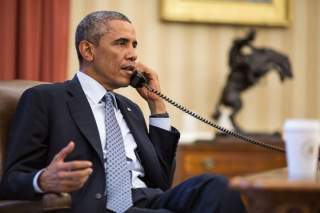In Asia, U.S. Economic Leadership Is Under Attack
President Obama should take advantage of the United States’ slow but steady economic recovery to strengthen the economic component of the rebalance to Asia.
On the intra-Asian trade and investment front, the 10-member Association of Southeast Asian Nations (ASEAN) remains active. “ASEAN Centrality” has replaced “ASEAN in the driver’s seat” as the new buzz-phrase. In contrast to the IMF and the ADB, ASEAN-centered organizations are not suffering from a loss of legitimacy. This judgment may seem odd, given their endless meetings and meager achievements. But ASEAN leaders have crafted ways of balancing all of the regional powers so that no single power predominates. The United States has adjusted constructively to this environment.
The 21-member Asia Pacific Economic Cooperation forum (APEC) is dedicated to free and open trade and investment in the Asia Pacific. APEC’s ultimate objective, supported by the United States, is a Free Trade Area of the Asia Pacific (FTAAP). China has recently embraced this goal, but some fear that Beijing’s main purpose is to divert near-term attention and resources from the TPP.
Given these circumstances, the United States should not oppose China’s organizational initiatives, nor should it try to block other countries from participating in them. Doing so feeds the erroneous “containment” narrative spread by Chinese officials. Instead, Washington should smile benignly on China-backed organizations such as the AIIB and avoid putting pressure on other governments not to join them. Asia-Pacific governments have no intention of being dominated by China, and U.S. friends and allies are already well aware of the importance of sound financial practices.
There is not much that the United States can do directly to promote greater liberalization of trade and investment within Asia. But it should continue to encourage progress toward these goals through high-level visits and periodic statements of support. It should continue to reiterate that the TPP is open to others willing to make the necessary commitments, and that the TPP is an integral part of an eventual FTAAP. It should also provide more funding and technical support for ASEAN initiatives aimed at poorer countries, such as customs modernization and efforts to mitigate climate change.
3. Restoring and strengthening the global institutions responsible for international trade and financial governance
Simultaneously, senior U.S. officials including the president should do more to rebuild the legitimacy of regional and global institutions. The United States, the European Union and Japan should surrender their monopoly of the three top positions. China and developing countries’ under representation in these institutions should be rectified without conditions, even though China will now have its own bank. It is important to keep China engaged in the existing global order, whether or not its separate initiatives succeed.
In doing so, the White House should renew efforts to pass IMF reform legislation as a logical accompaniment to trade bills. In this context, full and timely payment of U.S. assessments due to multilateral development banks is essential.
***
In present political circumstances, many of these initiatives may seem unrealistic. Nevertheless, the time to act is now. President Obama should take advantage of the United States’ slow but steady economic recovery to strengthen the economic component of the rebalance. He should spell out the reasons why meaningful achievement in this area would help restore U.S. political-economic leadership in the Asia-Pacific, and why that matters. He should make the case that U.S.-backed reform of postwar economic and financial institutions would burnish their legitimacy and reinforce the norms that underpin global prosperity.
Above all, the president should argue that meaningful action on all three tracks—bilateral, regional, and global—would stem the erosion of the U.S. leadership position in Asia and contribute substantially to broad U.S. strategic and national security goals.
Ellen L. Frost is a Senior Advisor to the East West Center and a Visiting Distinguished Research Fellow at the National Defense University. She was formerly Counselor to the U.S. Trade Representative and Deputy Assistant Secretary of Defense. The views expressed in this paper are those of the author and do not necessarily represent those of the National Defense University, the Department of Defense, or the U.S. Government.
Image: WhiteHouse.gov Pete Souza

